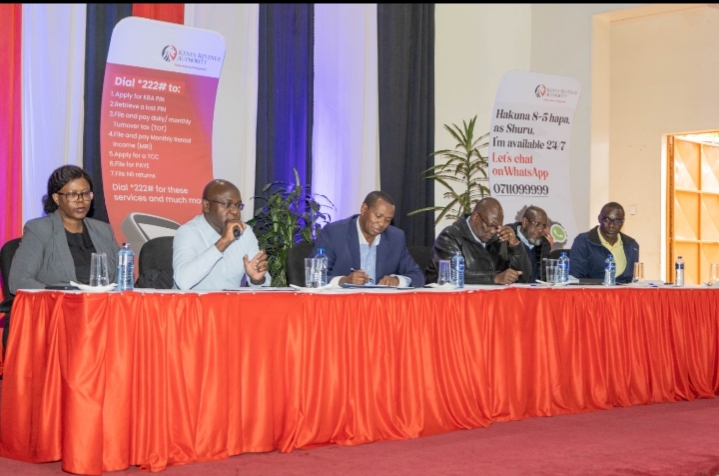Kenya Reaffirms Coffee Reforms as Farmers Push for Growth and Fair Returns

Principal Secretary Patrick Kilemi speaking during the press briefing,engages farmers at the International Coffee Day celebrations, pledging government support to revitalize Kenya’s coffee industry through reforms and direct payments.
Nairobi, 1 October 2025– Kenya marked this year’s International Coffee Day with renewed commitment from government, sector leaders, and farmers to strengthen reforms, expand domestic consumption, and restore the country’s coffee industry to its former global standing.
Speaking on behalf of the Cabinet Secretary for Cooperatives and Micro, Small and Medium Enterprises Development Hon Wycliffe oparanya, Mr. Patrick Kilemi the principal secretary of state department for cooperatives said that the government is determined to secure the future of coffee farmers through new legislation, direct payments, and stronger cooperative governance.
“The Coffee Bill has been passed by both the National Assembly and the Senate, and only a few issues remain to be harmonized before the President assents to it,” Kilemi told farmers. “We want a new legal framework that guarantees democracy in cooperatives, fairness in marketing, and accountability in our coffee institutions. The farmer must get at least 80 percent of the value of their coffee.”
He also noted that through the Direct Settlement System (DSS), 590,000 farmers have already accessed Sh9.5 billion, with money going directly from buyers to growers. “This ensures certainty, transparency, and respect for our farmers. If we respect farmers, they will give us better yields,” he said, adding that smallholder producers must increase productivity per bush to secure higher incomes.
Kilemi further urged the industry to invest in local consumption to reduce reliance on volatile international markets. “When we export coffee as beans, we are exporting jobs. Let us build a domestic coffee culture led by our youth. We must take coffee to Instagram, TikTok, our universities, and our workplaces. Let us make coffee cool again,” he said.
Hon. Wafula wamunyinyi the former member of parliament for kadunyi consituency who was also present in the celebration said that Kenya is known for its premium Arabica coffee, have seen production fall from 150,000 metric tonnes in the 1980s to about 40,000 tonnes in recent years saying that the government now targets 150,000 tonnes in the next three years through expanded acreage, provision of seedlings, and improved agronomic practices.
Mr. Henry Kinyua, an advisor at the Executive Office of the President and founder of Kilimo News, emphasized the importance of price transparency. “Farmers must know the value of their coffee in real time. Yesterday the average price was $366 per 50kg bag at the Nairobi Coffee Exchange. Information is power,” he said, urging farmers to embrace digital platforms for market updates.
Fairtrade Africa’s Regional Lead for East and Central Africa, Ms. Agapeters Sebasu, called for innovation and inclusivity in the coffee value chain. “Coffee in Kenya is more than a crop, it is a tradition and livelihood. We must strengthen cooperatives, embrace processing and value addition, and ensure women and youth are fully integrated. Stronger cooperatives mean stronger foundations for future generations,” she said.
She also challenged Kenya to boost domestic consumption, noting that Ethiopians consume over 50 percent of their production while Kenyans consume less than five percent. “We cannot continue producing the best coffee in the world but fail to drink it ourselves,” she added.
Farmers’ representatives echoed the call for modernization, improved equipment, and training. “We need to move from 2kg per tree to at least 10kg, and support new farmers in emerging areas such as Rift Valley and Western Kenya,” said Mr. Joseph Gitonga. “Seedlings, extension services, and modern pulping machines will ensure both higher yield and better quality.”
Former coffee leaders at the event praised the reforms, noting that the DSS and Sherifund loan facility had restored confidence among farmers. “For years, farmers toiled without pay. Today, with guaranteed payments and reduced exploitation, they can enjoy the fruits of their labour,” said one delegate.
Mr. Timothy mirugi, The Director of the Kenya Planters Cooperative Union (KPCU), reaffirmed government’s commitment to sustaining the momentum. “This is a multi-billion industry built by our hardworking farmers. We must continue increasing production, investing in domestic consumption, and opening new markets in Asia and the Middle East,” he said.
The farmer’s delegates also highlighted the global opportunities for Kenyan coffee. Emerging markets in China, India, and South Korea are showing strong demand. “Our challenge is not lack of buyers, but lack of enough coffee to supply them,” noted one delegate.
The event also spotlighted women’s contribution to the sector. Delegates recounted the success of Zawadi Coffee, the first Fairtrade-certified women’s coffee brand in Kenya, processed and packaged through cooperative support.
As celebrations concluded, the message was clear: coffee remains a symbol of national pride and resilience. “Kenyan coffee, Kenyan pride. Our coffee, our pride,” Kilemi declared. “We must protect and promote this crop not only for today’s farmers but for generations to come.”





